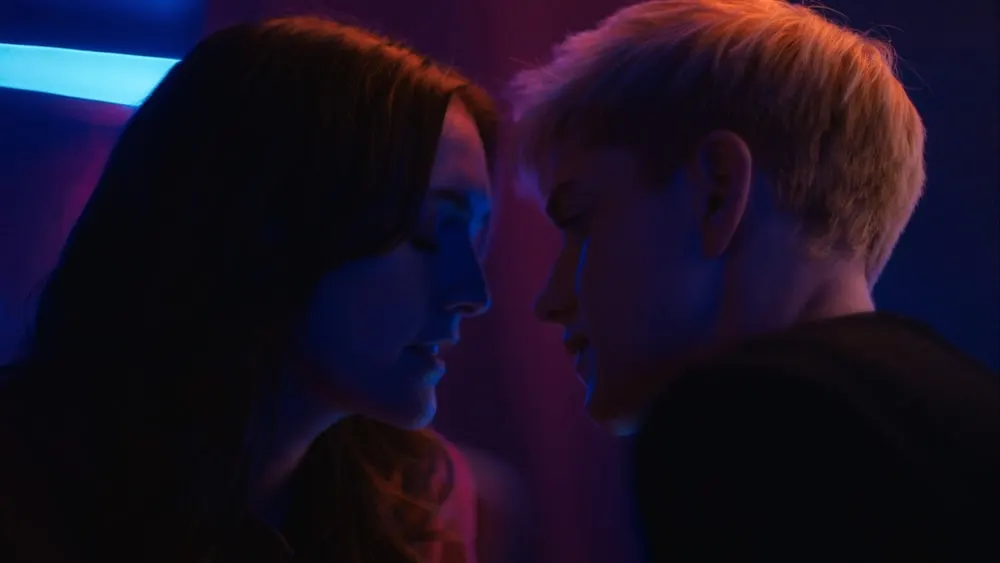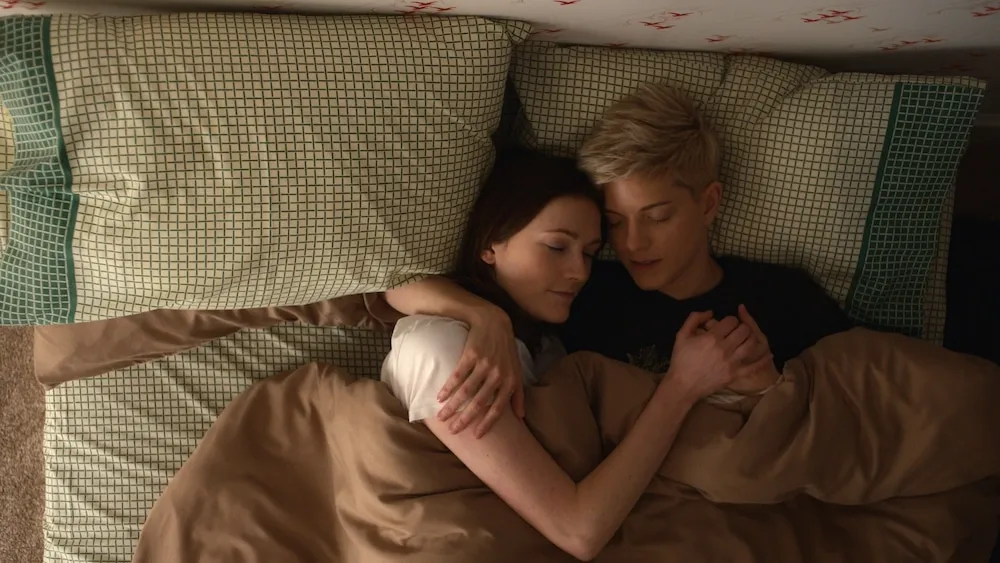Charlotte Ritchie and Mae Martin in Netflix’s Feel Good. (Objective Fiction/Netflix)
Ahead of their return in season two of Feel Good, Mae Martin and Charlotte Ritchie talk the media’s obsession with gender and being friends with Elliot Page.
Feel Good is a love story – a narrative, scripted, comedy drama – created by bisexual comedian Mae Martin and starring Charlotte Ritchie, who plays their (ex) girlfriend, George.
It’s a story about about codependency, and addictive behaviour; what’s healthy and what’s not. Mae plays a fictionalised version of themselves – a stand-up comedian who has used drugs unhealthily in the past – and Charlotte a woman in her first queer relationship.
At the start of the second season, which will soon drop on Netflix, Mae, who’s back in Canada, is dropped off at rehab by their parents. Even in the trailer, it’s clear that the second series will be as deeply personal, nuanced and funny as the first: delving into Mae’s past traumas, George newly working out what she wants from life, and Mae coming out as Adam Driver.
Much of the coverage about the second season of Feel Good, and Mae, has focused on the fact that the comedian came out as non-binary this year and that their character will do the same in the second season.
But, as Charlotte tells PinkNews, Feel Good is about “sex and what that means to a relationship, the way that your past can inform your present, and trauma, and PTSD. And parents and families and work”.
She adds: “That’s not to say that Mae being non-binary isn’t important, but there’s a depth to this show that is being missed by only focusing on that.”
Mae says they thought that by writing their Instagram post about being non-binary, they “wouldn’t have to then have a million conversations about it”.

“I get that it’s still a thing, and it’s important, but it’s like you spend all this time writing something nuanced about something that’s so complicated and personal. And then you forget that it’s then taken and put within the parameters of quite a reactive public discourse,” they tell PinkNews.
But Charlotte says she did anticipate that it would be a focus.
“It’s the categorisation of the world, right?” she says. “It’s the legacy of empire. Everyone is so concerned with getting to know who you are externally.”
It feels to her that because non-binary is “a thing” at the moment, it’s been decided that this will be what is written about the show. “There’s just a disproportionate number of articles about gender,” she says.
Mae agrees, adding that this “feeds into this hysteria around it and adds to the backlash we’re experiencing”.
Cis people don’t get asked about their gender, like how men don’t get asked about the Me Too movement.
Charlotte says that she doesn’t get asked about her gender as a cis actor, in the same way that journalists who ask her about the Me Too movement don’t ask the same questions of men.
She says: “This is what I constantly find I come up against when I have conversations with people about gender and sexuality, is that people who are heteronormative are so concerned with what it means for them, if other people get to decide who they are.
“And it’s like, it’s not about you. Why do you so badly need to be externally defined? Why does it need to be binary for you? What is threatening you about this situation? I think it’s very forward-looking to be self-defined. In a spiritual way that’s really important, that you decide who you who you are.”
Both agree that in the future, actors will not be asked about sexuality or gender – because the lines between queer or straight, cis or trans will have been blurred to the point where those labels are no longer needed.
Mae says it feels like there’s a “big wave of progress coming, and if people can just relax about it… it’s only going to benefit cis people as well”.
They continue: “I mean things like men’s mental health – male suicide is an epidemic, and of course trying to fit into that totally unachievable masculinity thing is contributing to that. Blurring those lines is going to help everybody.”
When Mae Martin met Elliot Page
This week, for the paper’s interview with Mae Martin about Feel Good, Elliot Page told the New York Times that he is “a friend and a fan”.
The two of them – both Canadian, and the same age – “weirdly met in a bar when we were 19”, says Mae.
“I was like a weird sort-of homeless stoner – I had an apartment, but there were no locks on the door,” Mae recalls. “Elliot was filming X-Men at the time, I think, and we had a mutual friend.
“So we had that one night, and then years later Elliot sent me a message saying he’d seen my stand-up, and then we became friends.”
Elliot sent Mae a message last year, while they were filming the second season of Feel Good, saying he was going to come out publicly and had just had top surgery. His message came when Mae was “in the midst of it all and feeling quite stressed about it”.
“That was very inspiring, and reassuring,” they say. “It’s nice to have someone you can bounce off of who’s going through something similar.”
Feel Good season two is out on Netflix on 4 June.
